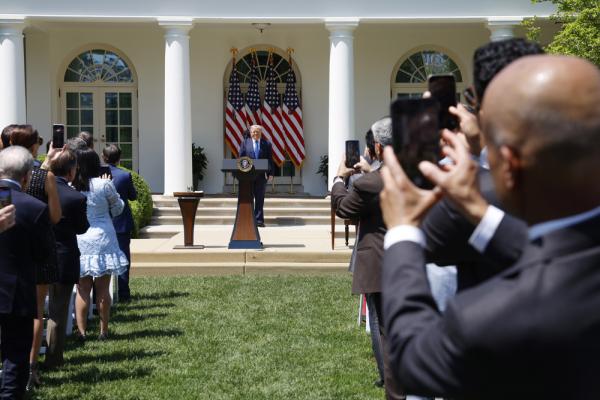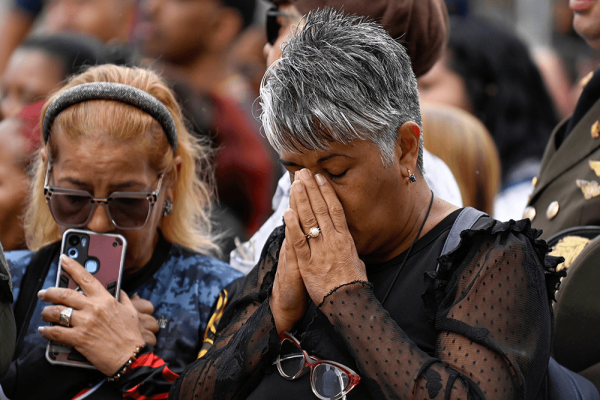During the first White House National Day of Prayer of his second term, President Donald Trump said he is making America “rich, healthy, and religious again.”
Trump’s approval ratings have dropped sharply since he returned to the White House and stand at 42% after his first 100 days in office, according to a poll by NPR. Still, Trump claimed that the spirit of the country shifted positively since Nov. 5, the day he was elected. Trump said his administration was “bringing religion back” to the United States of America.
The National Day of Prayer invites people of all faiths to pray for the nation, according to the National Day of Prayer Task Force, a privately funded organization that encourages people to participate in the event. President Harry S. Truman signed the annual Day of Prayer into law in 1952, and President Ronald Reagan moved the day to May in 1988.
In the proclamation, Truman said the National Day of Prayer was a time when Americans “may beseech God to grant us wisdom to know the course which we should follow, and strength and patience to pursue that course steadfastly. May we also give thanks to Him for His constant watchfulness over us in every hour of national prosperity and national peril.”
Politicians throughout American history have used religious language to appeal to the public and elevate their public persona.
Presidents have been using religion in their rhetoric “and even trying to cast themselves, in some cases, as anointed figures almost since the beginning of the Republic, and if presidents don’t do it, the public often does,” said Randall Miller, professor emeritus of history at St. Joseph’s University.
Since the nation’s founding, American exceptionalism has coursed through the United States, and along with it the belief among some Americans that presidents are specifically chosen by God to serve in their position. This belief often stems from seemingly miraculous events in the presidents’ lives.
President George H.W. Bush was shot down as a fighter pilot in World War II. Neither of the crew members on his plane survived, but an American submarine surfaced and rescued Bush.
“Why had I been spared? What did God have in store for me?” Bush said of the event.
Kennedy similarly survived the same war.
“In the public mind and in political strategy, making that connection between being God’s anointed and the chosen one is extremely powerful,” Miller said.
Trump, and many around him, have suggested that God saved him from the assassination attempt in Butler, Pennsylvania, last July, specifically for the purpose of serving as president again.
“I believe that my life was saved that day in Butler for a very good reason. I was saved by God to make America great again. I believe that,” Trump said in his State of the Union address.
“Father, you saved him by your grace and for your purpose to stand, to represent, and to save America,” Bishop Kelvin Cobaris, lead pastor of New Life Church International of Plant City, Florida, said while praying during Thursday’s event.
Paula White, senior advisor to the White House Faith Office, called Trump “the greatest champion of faith we’ve ever had.”
“Grant him wisdom beyond human understanding and capability and give him divine dreams, visions,” she prayed at the Rose Garden.
While American presidents often appeal to their religious beliefs or connections to convey their morality to the public, there is also a danger in using religion for political gain and appearing inauthentic or mocking, Miller said.
During the Black Lives Matter protests in 2020, protestors were tear-gassed while Trump passed through Lafayette Park to stand outside St. John’s Church for a photo holding the Bible.
Some thought it seemed as though Trump was using the Bible as a prop.
“The president just used a Bible, the most sacred text of the Judeo-Christian tradition, and one of the churches of my diocese without permission as a backdrop for a message antithetical to the teachings of Jesus and everything that our churches stand for,” Bishop Mariann Edgar Budde, American Episcopal bishop of Washington, told CNN afterward.
Just this week, Trump jokingly suggested that he be chosen as the next pope.
“I’d like to be pope. That would be my number one choice,” he told the press.
During his Day of Prayer remarks, Trump spoke about the White House Faith Office, which, according to Trump, operates out of the White House.
“They say ‘Separation between church and state,’ they tell me. I said, ‘All right, let’s forget about that for one time. Really, separation? I don’t know. Is that a good thing or a bad thing? I’m not sure,” Trump said.
Though Trump is not known to be a regular churchgoer, his rhetoric in regard to religion has appealed to many Americans.
According to Miller, some Christians say, “God uses the tools that he wants. He could use an imperfect tool, such as Trump, in order to achieve a larger objective.”
At the conclusion of the event, Trump signed an executive order creating a religious liberty commission.
Experts said although Trump is a divisive figure, he has influence on the moral values of the country.
“He’s doing things, in terms of an evangelical Protestant perspective of those who support Trump, that they wanted and other presidents said they would do, and they didn’t. In that sense, he is a moral agent, even if he is not necessarily morally a representative of the best kind of behavior,” Miller said.
Got something to say about what you're reading? We value your feedback!






